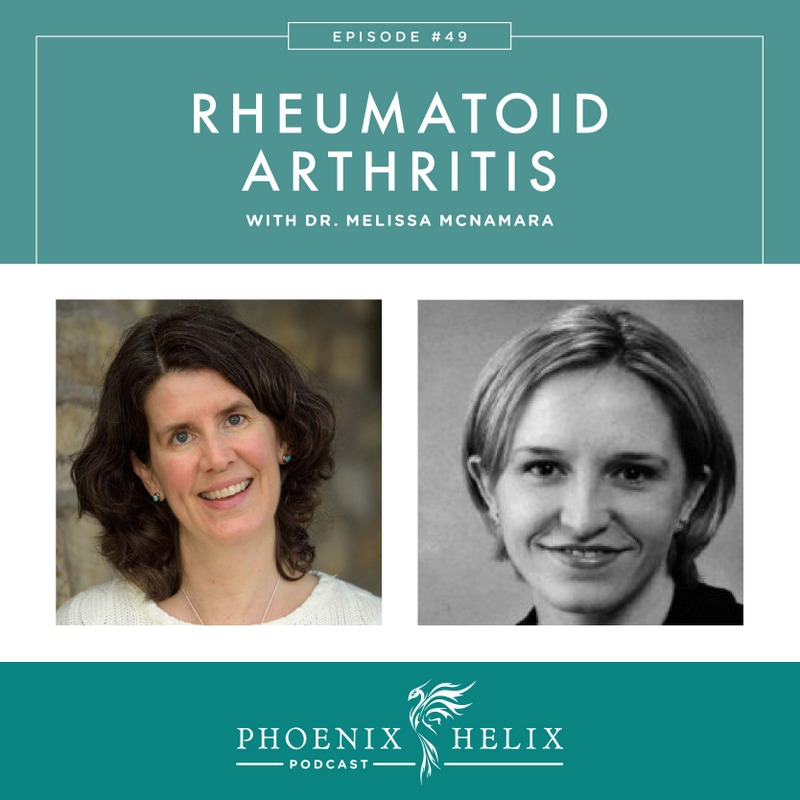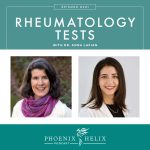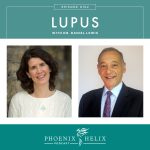
Q&A with a Paleo Rheumatologist
Finding a rheumatologist who combines paleo principles with functional medicine to address root causes, and conventional medicine to control symptoms when necessary, feels very much like finding a unicorn. One of my blog readers let me know about Dr. Melissa McNamara, who practices in the Bay Area of California but also consults with people worldwide. She took time out of her busy schedule to share her treatment philosophy, when it comes to rheumatoid arthritis (RA).
Listen to the Show
- Subscribe to my podcast through your favorite podcast app: iTunes, Stitcher, Google, TuneIn, Spotify, Amazon, etc.
- You can also listen to the episode right here through the player below, and if you subscribe to my newsletter you’ll get notified of future episodes.
Podcast: Play in new window | Download
Show Notes
- Intro (0:00)
- Thank You to our Podcast Sponsor – Paleo on the Go (1:38)
- A frozen meal delivery service, they have a large menu of items for the paleo autoimmune protocol (AIP).
- Use the code PHOENIX for 10% off your first order.
- Meet Dr. McNamara (2:29)
- She received her medical degree from the University of Florida and her Rheumatology fellowship through UCLA.
- She has a private practice in San Ramon, California, called the Arthritis and Rheumatology Center. However, she also consults with people around the world. Contact her office for more information.
- When she started her practice, she treated RA from a conventional medicine perspective, focusing on suppressing the immune system rather than looking for root causes. When a patient approached her about the possibility of dietary healing, instead of dismissing that patient, she started researching the idea further. This led to a complete shift in her treatment paradigm. Now trained in functional medicine as well, she treats patients from both points of view.
- Gluten-Free as the Starting Place for RA Treatment (7:17)
- For patients who are willing, she starts them on a 3-month gluten-free trial. She does a muscular-skeletal ultrasound and a doppler ultrasound to the affected joints at the start and end of the 3-months, to assess effectiveness. With prescription medication, the hope is to see 20% improvement in that period of time. Dr. McNamara has seen gluten-free give some patients as much as 50% improvement.
- RA Autoimmune Spectrum (12:23)
- Dr. McNamara sees RA as having a spectrum of severity.
- At the mildest side is a positive rheumatoid factor and some joint pain, but no fluid pockets or signs of inflammatory arthritis. Many people are told this is a “false positive” for the rheumatoid factor. Dr. McNamara sees it as early detection, showing you are at risk of manifesting RA and it’s a good place to take steps for prevention.
- At the other end of the spectrum is RA diagnosis: (1) arthritis in multiple joints with fluid pockets (2) usually affecting the hands, wrists and feet, although other joints can be involved as well (3) arthritis appearing on both sides of the body (4) present for more than 6 months (5) usually accompanied by a positive rheumatoid factor (although not always).
- What Rheumatoid Arthritis Does to the Body (16:18)
- RA causes an inflammatory cascade within the body that focuses especially on the joints, leading to high levels of pain, and if left unchecked – disability.
- However, the inflammation also affects the rest of the body, and systemic inflammation increases the risk for heart disease and cancer.
- Conventional vs Alternative Tests for RA Activity (20:50)
- For RA diagnosis, most rheumatologists test for positive rheumatoid factor and anti-ccp antibodies. Dr. McNamara does as well. However, she tests for individual rheumatoid factors in addition to the combined rheumatoid factor that is more typically ordered. She has seen the individual markers elevated where the combined came back negative.
- Most rheumatologists track CRP and ESR to measure bodywide inflammation, but these can be normal even when inflammation is present. Dr. McNamara tracks 12 additional inflammation markers through the Vectra DA blood test.
- Most rheumatologists use x-rays to track joint damage. Dr. McNamara uses musculoskeletal ultrasound and doppler ultrasound. X-rays offer just a few views of a joint, whereas ultrasound can offer a 180-degree view. The ultrasound can catch bone erosions sooner. It also measures fluid pockets (an active sign of inflammation), and has no radiation exposure whereas x-rays do.
- Are Joint Erosions Permanent or Can They Be Reversed? (25:28)
- If an erosion is 2ml or greater, it’s probably permanent. But Dr. McNamara has seen smaller erosions reverse and the bone rebuild. Ultrasound allows her to catch erosions when they are small enough to reverse the process.
- Dr. McNamara’s Dietary Protocol for Autoimmune Healing (26:20)
- While not all of her patients are interested, she does recommend diet as part of her RA treatment plan. She starts people with less restrictions first, only adding more if they don’t get results with the first steps:
- Step 1: Go gluten-free. Dr. Alessio Fasano has shown that gluten causes leaky gut, and leaky gut needs to be present for autoimmune disease to develop. I interviewed him in Episode 32 of this podcast.
- Step 2: Go rice-free. Since rice contains arsenic, and heavy metal toxicity can interfere with autoimmune healing, she recommends removing rice from the diet altogether. For more information on white rice – the pros and cons – read this article: What’s Up With White Rice?
- Step 3: Limit intake of all forms of sugar and high-glycemic foods.
- Step 4: Go dairy-free.
- Step 5: Go grain-free.
- Step 6: She doesn’t believe most people need to do the complete paleo autoimmune protocol. In her practice, she doesn’t see much difference between paleo and AIP in terms of results – with one exception. She does recommend people eliminate nightshades and then reintroduce them one at a time, to test for tolerance. Her paleo autoimmune recommendations are more in line with the Wahls Protocol.
- Alternative Medications for Rheumatoid Arthritis (40:46)
- Low-Dose Naltrexone: She has seen it help patients with pain. Her only reservation is that there is limited research on its long-term impact on the body or the disease process. She expects the downside is minimal, but she wants more data.
- Low-Dose Antibiotics: Research has shown that this is an effective disease-modifying treatment. Her only concern is that antibiotics cause leaky gut. However, every medication is a matter of weighing the risks vs. benefits and she has patients who respond very well to this protocol.
- Medical Marijuana: She only recommends topicals or edibles. Data shows clearly that smoking and vaping marijuana is carcinogenic. There is no question that it can help pain for some people, but she hasn’t seen it affect the disease process itself. It also causes heartburn in some patients, which she finds concerning.
- Functional Medicine Interventions (47:49)
- Dr. McNamara tests and treats a wide variety of things that can affect autoimmune expression, and it can take time to address all of these layers. (Which can explain why sometimes we don’t respond to diet and/or medication alone.):
- Hormone Balance
- Adrenal Fatigue
- SIBO
- Gut Dysbiosis
- Gut Infections
- Nutrient Malabsorption
- Lyme Disease
- MTHFR Mutation
- Checking for Other Autoimmune Diseases
- Pre-Diabetes
- Vitamin Deficiencies
- Heavy Metal Toxicity
- The Role of Conventional Medication (54:48)
- While Dr. McNamara’s goal is to help people reduce and/or eliminate their need for conventional medication, there are times when medication is necessary.
- If a new patient is presenting with extreme pain, they aren’t going to have time for the functional medicine to work, so medication is an appropriate first step.
- Other times, a patient has tried both diet and functional medicine but is still showing signs of inflammation and disease activity that can damage the joints. Medication is the right choice then also.
- Dr. McNamara doesn’t see medication as a life sentence. It can be helpful either short or longterm. She likes her patients to commit to medication for at least a year to get their disease under control, before trying to reduce it. They can work on functional medicine during that year as well, to treat the root causes in the background.
- While her hope is to eventually get most of her patients off medication, that has only happened for a small minority at this point.
- Is Remission Possible? (59:11)
- Absolutely. Remission doesn’t just happen one day. It’s a process that happens slowly over time, and functional medicine is key to that.
- Dr. McNamara has a high number of patients in her practice who are in remission, and she measures that by having no swollen joints at all. Some of these patients are on medication and some aren’t.
- She can’t think of one patient who has diligently pursued the healing of root causes, who still has an out-of-control disease process. This is very different than when she first started her practice and could only treat people with medication alone.
- Outro (58:45)
- Dr. Melissa McNamara is accepting new patients and does consult with people worldwide. Visit her website for more information: ImmunologyGlobal.com.
- Eileen (your podcast host) is the author of multiple books, written to help people thrive with autoimmune disease. Learn more on the Books Page.
- If you like this podcast, follow or subscribe through your favorite podcast app. You can also subscribe to Eileen’s biweekly newsletter.
- Check out the entire archive of podcast episodes.
You May Also Be Interested In
Spreading the Word
If you like the podcast, please leave a positive review in iTunes. It would mean the world to me, and also helps others find the podcast. Here are some quick instructions using your iPhone:
- If you are already subscribed to my podcast: (1) Click the purple podcast icon. (2) At the bottom of the screen, click Library. (3) At the top of the screen, click Shows. (4) Click the Phoenix Helix podcast image. (5) Scroll down the page, and you’ll see Ratings and Reviews. Scroll down a little bit more and click on Write a Review. This will bring up the review screen. Tap 5 stars (if you love the podcast), and then click in the title box, and it will bring up the keyboard. Enter a title and short review. (6) Click Send in the upper right corner. (7) Thank you! Positive reviews give the podcast a higher search ranking in iTunes, helping people find it and letting them know it’s a quality podcast and worth their time to listen.
- If you haven’t subscribed to my podcast: (1) Click the purple podcast icon. (2) In the lower right corner, click the magnifying class. (3) Type Phoenix Helix in the search box. (4) Click the podcast cover in the Show list. (5) If you’d like to subscribe, click the + sign at the top of the screen. (6) To write a review, scroll down the page, and you’ll see Ratings and Reviews. Scroll down a little bit more and click on Write a Review. This will bring up the review screen. Tap 5 stars (if you love the podcast), and then click in the title box, and it will bring up the keyboard. Enter a title and short review. (7) Click Send in the upper right corner. (8) Thank you! Positive reviews give the podcast a higher search ranking in iTunes, helping people find it and letting them know it’s a quality podcast and worth their time to listen.








Hi Eileen,
Do you find that changes in weather (transition to cold or pressure changes especially) cause you to flare? I started AIP almost a year ago, have ruled out other food sensitivities and am implementing the lifestyle changes as much as I am able to control, and am having terrible arthritic flares out of nowhere – the weather is one of the only culprits I can think of – is that way out of left field? Thanks in advance!
Fallon, I was very susceptible to changes in weather before I gave up nightshades completely. Once I went nightshade-free, that went away. Are you still eating nightshades? I found that I had to give them all up, including the spices. Even trace amounts would keep that inflammation and weather sensitivity going.
Thanks for the quick reply! I have been nightshade free for as long as I’ve been on AIP (almost a year). I haven’t even tried reintroducing them (I use NAET to confirm sensitivities and nightshades are definitely huge for me). I may begin looking into underlying infections or something along those lines? I’ve always been curious, too, when you say you’ve reduced symptoms by 95%, does that mean you still have daily arthritic pain? I feel like that shouldn’t be the case with all the steps I’ve taken, but the RA component is new for me (started with Hashis), and while I’ve lost TONS of symptoms, the joint pain and stiffness is still almost a daily battle.
Fallon, RA pain is uniquely intense. I went from excruciating pain that was completely unmanageable no matter how many painkillers I took, to living pain-free with just 1 Aleve tablet twice daily. While I wished I could have gone off painkillers completely, I’m aware that for someone with RA, this is a very small dose. You can read my complete story on my About Me page. If you plan to pursue functional medicine testing (which I think is a great idea), I recommend reading this article: How to Find a Good Functional Medicine Practitioner. You also might want to consider Low-Dose Naltrexone, a mild medication that is sometimes very effective for people with RA. I think Dr. McNamara and I discussed that a little bit in this episode, but I talked about it in detail with Dr. Thomas Cowan in Episode 39 of my podcast. Wishing you wellness in every way!
Eileen, I just wanted to tell you how grateful I am for your podcast with Dr. McNamara. Although I was Paleo for 3 years and AIP for 1 and a 1/2 years, my body flared two months ago and I could not get it under control. Got to the point I couldn’t walk. Searching for a quality rheumatologist can be overwhelming. I had a bad experience with “the best” rheumatologist in this area. My naturopath reached out to other NDs in the area and no one could recommend one. Your article convinced me this was the doctor for me. I was encouraged that she did consultations and thought maybe I could Skype this. Alas, she does need to see you in her office. We decided to go for it and my husband and I flew down on Sunday for an appointment yesterday. I can’t say enough GOOD things about her. If every doctor were like her, we would have a different medical system today. She listens, cares, digs, does ultra sounds right there in office, gathers all the information she can, and lets you know she is committed to your healing. She doesn’t just throw a prescription in you face, which was my experience with the other. We left confident that she was going to find root causes, but helping me live comfortably today with the least amount of medication possible in the process. She is an answer to prayer and I am deeply grateful to you for you interview and to her for her responsible and compassionate view of medicine. These past few months of pain have been a bit dark, but there is light today. Sending you hugs and wishes for your continued healing.
Kathy
Kathy, thank you so much for this testimonial. I’m so happy that you and Dr. McNamara are able to work together. May your flare quickly become a thing of the past, and your healing fast-forward from here.
I just found your website today and the podcast with Dr. McNamara is almost in perfect sync with my saga of health problems. I also live in the Bay Area and will be calling! This has been most helpful. Thank you!
Gael, that’s wonderful. I hope Dr. McNamara is a great fit for you.
Thank you so much for this podcast! It was perfect timing for me as well. I just had a less than stellar appointment with my rheumatologist, who gave me a sympathetic head tilt and some tsking as she obviously thought I haven’t been taking care of myself well. I have been AIP for a year and a half and had been feeling GREAT until 6 weeks ago when a flare came out of nowhere. Couldn’t figure out the trigger. I have been trying LDN for the last few weeks (which she also looked very displeased about) and made an appointment with her to talk about methotrexate again. I feel like that is definitely listening to my body and trying to take care of it, so I think I just have to admit that she is just not the right rheumatologist for me. Luckily, I live in the Bay Area! I am definitely calling this doctor, who seems like a much better fit for me – someone who can see the benefits of both diet/lifestyle and prescriptions and actually listens to her patients.
That’s awesome that you live in the Bay Area, Alison. Yes – you are definitely tuned into your body – and that should be respected, not dismissed.
Great to hear that a rheumatologist dares to step outside the box. Lets hope she inspires others as well. I will definitely bring a copy of the podcast with me next time I see mine. I am thinking, a lot of listeners might have been affected by your previous podcast, I was. This very positive message came at the right time. Excellent. Thank you!
Hi Karel. Yes, let’s hope it’s the start of a trend.
WOW, this was so powerful for me Eileen – and so timely. I am working with my Rheumatologist right now on how to reduce the inflammation and pain I’m experiencing and am currently on Leflunomide – tried Methotrexate last year and had an allergic reaction, so of course it’s off the table. I can only take tylenol arthitis due to ulcers and it does seem to help a bit with the pain, but of course, is not an anti-inflammatory.
I really want to thank you for this podcast. It is so applicable to my circumstance and at the best time I think.
Bless you Eileen.
I’m so glad, Louise. I learn so much from these podcasts, too.
Hi Eileen, Thank you for this interview. Very informative! I’m hoping this info and the possibility of working with this doctor can help me. I have ms and recently showed markers for Lupus. I am in terrific pain and feel a ray of hope. Laurie
Laurie, I’m so happy this podcast rekindled your hope. May Dr. McNamara uncover the missing pieces to your healing puzzle, so that your pain is relieved and your health improves in every way. Sending you a gentle hug.